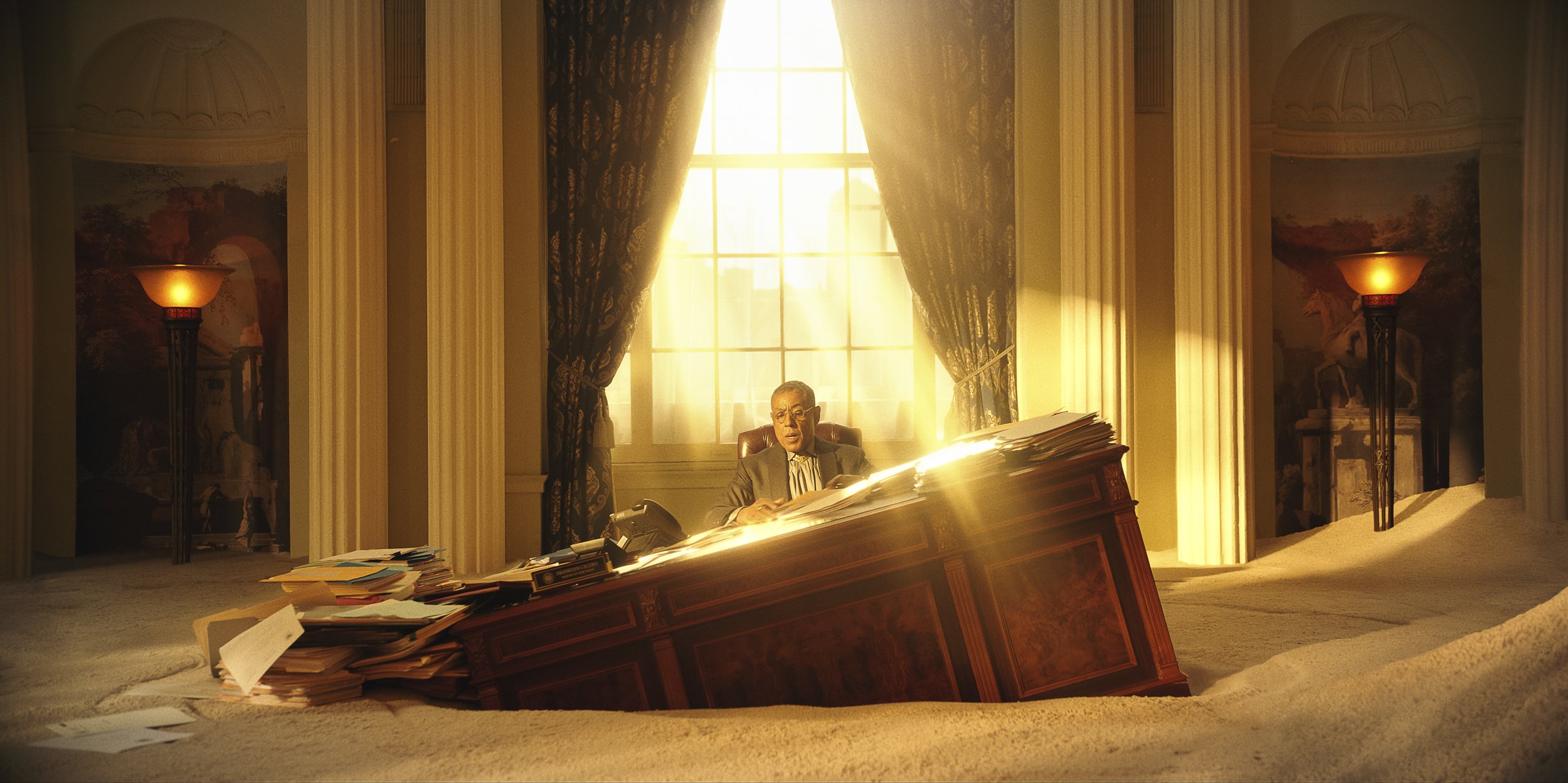‘Megalopolis’ - Review
Francis Ford Coppola's latest film, Megalopolis, forty years in the making, has been polarizing and baffling audiences and critics ever since its debut at Cannes earlier this year. The FilmSlop editorial team is torn over Megalopolis, with some saying it is the worst movie they have ever seen and others saying it was an incredible swan song by Coppola. We’re not the only ones: the Letterboxd review curve for Megalopolis is entirely flat. I am still thoroughly bewildered by its existence. But despite the chaotic spectrum of reactions, one common thread connects the dissenting opinions: Coppola's film urges us to question the future. To understand what Megalopolis says about tomorrow, we must superimpose Megalopolis onto the present. There is no "solving" Megalopolis. The funhouse mirror of Megalopolis reflects the patterns of power, progress, and neglect that have historically shaped empires and continue to shape the contours of today’s world.
The movie is set in New Rome, a decaying empire in a parallel universe resembling our own. The city embodies a familiar contradiction: idealized visions of a brighter future coexist with the harsh realities of the present. Mayor Franklyn Cicero (Giancarlo Esposito) and Cesar Catilina (Adam Driver) represent the forces of pragmatism vs. idealism and their competing visions for a future world.
The Nobel Prize-winning Cesar is obsessed with innovation, blinded by his desire to create a utopia. Adam Driver captures Cesar with a magnetic intensity and messianic narcissism familiar to the titans of Silicon Valley who offer false promises of technological revolution. His discovery of “megalon,” an almost magical substance that defies the rules of physics, parallels the current fascination with artificial intelligence.
But just like "disruptive technology" in the real world, Cesar's quest for progress leaves a wake of destruction. Throughout the film, we see flashes of terror: people losing their homes, communities torn apart, and other instances of sacrifice at the altar of progress. Cesar may mean well, but his single-minded pursuit of perfection and his ego makes him forget the people his utopia is supposed to serve — a reminder that innovation without humanity is just destruction with better marketing.
Mayor Cicero, on the other hand, firmly clings to the status quo as a lifeline, refusing to let go even as New Rome collapses into nothingness. His aversion to change, stemming from self-serving motives and genuine adherence to traditional values, reflects how many politicians in America today remain complacent in the face of injustice. Just as the American metropolis continues to struggle with inequality while the threat of climate change looms ever closer, Cicero’s New Rome, too, constantly edges total disaster.
The interplay between Cesar and Cicero creates a power vacuum where the basic human rights of the masses are ignored. This vacuum allows the more selfish characters like Clodio Pulcher (Shia LaBeouf, a deeply questionable and disconcerting casting choice considering Shia’s history) to thrive. With his incisive rhetoric and unique ability to manipulate public discontent, Pulcher is a clear stand-in for the last ten years of MAGA-era politics. However, characters like Pulcher and Trump are never the root of the problem; they are merely symptoms of a deeper rot. In the same way that Trump rose from a political landscape dominated by disillusionment and neglect, Pulcher is the inevitable result of Cesar's blind 'progress' and Cicero's stubborn resistance to change. Trump is not the real issue; he's simply a symptom of the political system's failure and neglect of the masses.
In a seemingly triumphant conclusion, Cesar and Cicero set aside their beef to create "progress" together. Cesar's grand project comes to life, his vision of Megalopolis is realized, and he holds his newborn child, declaring them to be "the future," as he hurls platitudes toward the audience about the importance of protecting the future. This ending, while hopeful on the surface, ultimately feels devastating to me.
Cesar and Cicero have won — this is their moment of triumph. In their eyes, they have succeeded by working together. Yesterday's problems no longer concern them. The future is secured but only for the elite and their children. The masses and their children will remain an afterthought, never considered in the visions of "progress." The future is at the mercy of Cesar, Cicero, and others like them.
This "success" is all too familiar. It is the same pattern we see every election cycle. Politicians hold our fundamental human rights hostage, forcing us to choose between bad and worse. We must vote for the lesser of two evils because the alternative is cartoonishly sinister. But once the establishment prevails and power is restored, everything is okay. Joe Biden can spend years in office doing absolutely nothing while wealth gaps widen and thousands of Palestinians are killed. The establishment can afford to look away because their future — like Cesar's and Cicero's — is always part of the grand design. It's a vision that serves the few while leaving the many behind.
Megalopolis is certainly not without its flaws. Its intense brilliance, however, lies in its malleability - the sheer lack of inhibition in its form holds up a world that is brimming with potential. By creating a future with our own pieces and history, Coppola hands us a blank canvas where we can project and formulate our views of the world. Megalopolis imagines something rare: the intersection at both past, present, and future. To do this means Megalopolis doesn’t offer neat resolutions. Instead, it leaves us with questions, begging us to critically consider the cycles of history and our place within them.



